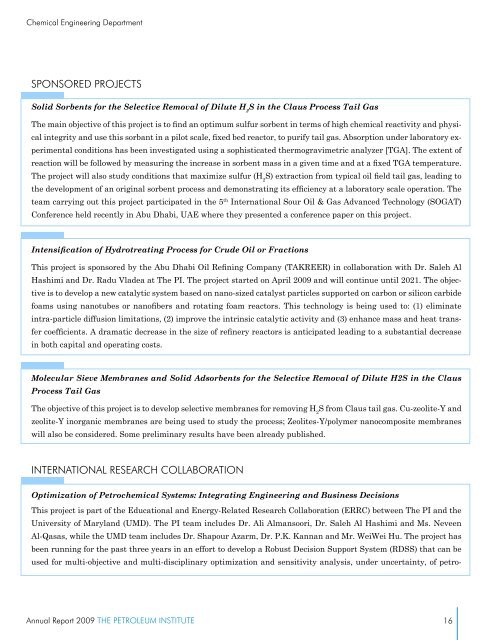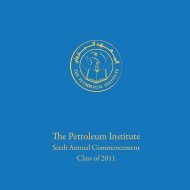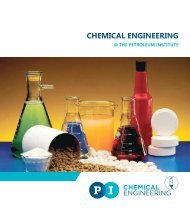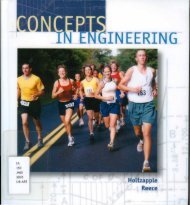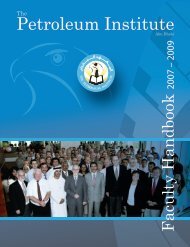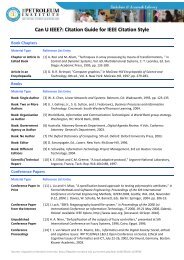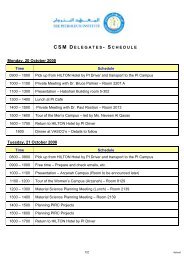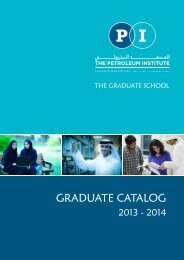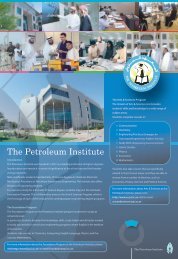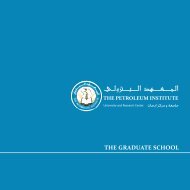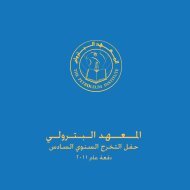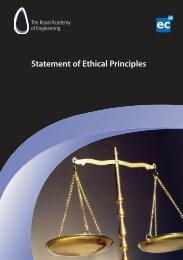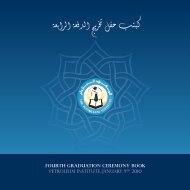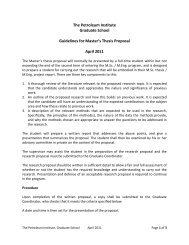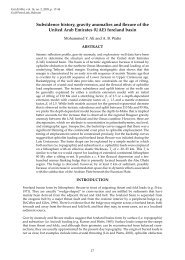The PI Annual Report 2009 - The Petroleum Institute
The PI Annual Report 2009 - The Petroleum Institute
The PI Annual Report 2009 - The Petroleum Institute
Create successful ePaper yourself
Turn your PDF publications into a flip-book with our unique Google optimized e-Paper software.
Chemical Engineering Department<br />
Sponsored Projects<br />
Solid Sorbents for the Selective Removal of Dilute H 2<br />
S in the Claus Process Tail Gas<br />
<strong>The</strong> main objective of this project is to find an optimum sulfur sorbent in terms of high chemical reactivity and physical<br />
integrity and use this sorbant in a pilot scale, fixed bed reactor, to purify tail gas. Absorption under laboratory experimental<br />
conditions has been investigated using a sophisticated thermogravimetric analyzer [TGA]. <strong>The</strong> extent of<br />
reaction will be followed by measuring the increase in sorbent mass in a given time and at a fixed TGA temperature.<br />
<strong>The</strong> project will also study conditions that maximize sulfur (H 2<br />
S) extraction from typical oil field tail gas, leading to<br />
the development of an original sorbent process and demonstrating its efficiency at a laboratory scale operation. <strong>The</strong><br />
team carrying out this project participated in the 5 th International Sour Oil & Gas Advanced Technology (SOGAT)<br />
Conference held recently in Abu Dhabi, UAE where they presented a conference paper on this project.<br />
Intensification of Hydrotreating Process for Crude Oil or Fractions<br />
This project is sponsored by the Abu Dhabi Oil Refining Company (TAKREER) in collaboration with Dr. Saleh Al<br />
Hashimi and Dr. Radu Vladea at <strong>The</strong> <strong>PI</strong>. <strong>The</strong> project started on April <strong>2009</strong> and will continue until 2021. <strong>The</strong> objective<br />
is to develop a new catalytic system based on nano-sized catalyst particles supported on carbon or silicon carbide<br />
foams using nanotubes or nanofibers and rotating foam reactors. This technology is being used to: (1) eliminate<br />
intra-particle diffusion limitations, (2) improve the intrinsic catalytic activity and (3) enhance mass and heat transfer<br />
coefficients. A dramatic decrease in the size of refinery reactors is anticipated leading to a substantial decrease<br />
in both capital and operating costs.<br />
Molecular Sieve Membranes and Solid Adsorbents for the Selective Removal of Dilute H2S in the Claus<br />
Process Tail Gas<br />
<strong>The</strong> objective of this project is to develop selective membranes for removing H 2<br />
S from Claus tail gas. Cu-zeolite-Y and<br />
zeolite-Y inorganic membranes are being used to study the process; Zeolites-Y/polymer nanocomposite membranes<br />
will also be considered. Some preliminary results have been already published.<br />
International Research Collaboration<br />
Optimization of Petrochemical Systems: Integrating Engineering and Business Decisions<br />
This project is part of the Educational and Energy-Related Research Collaboration (ERRC) between <strong>The</strong> <strong>PI</strong> and the<br />
University of Maryland (UMD). <strong>The</strong> <strong>PI</strong> team includes Dr. Ali Almansoori, Dr. Saleh Al Hashimi and Ms. Neveen<br />
Al-Qasas, while the UMD team includes Dr. Shapour Azarm, Dr. P.K. Kannan and Mr. WeiWei Hu. <strong>The</strong> project has<br />
been running for the past three years in an effort to develop a Robust Decision Support System (RDSS) that can be<br />
used for multi-objective and multi-disciplinary optimization and sensitivity analysis, under uncertainty, of petro-<br />
<strong>Annual</strong> <strong>Report</strong> <strong>2009</strong> <strong>The</strong> <strong>Petroleum</strong> <strong>Institute</strong><br />
16


